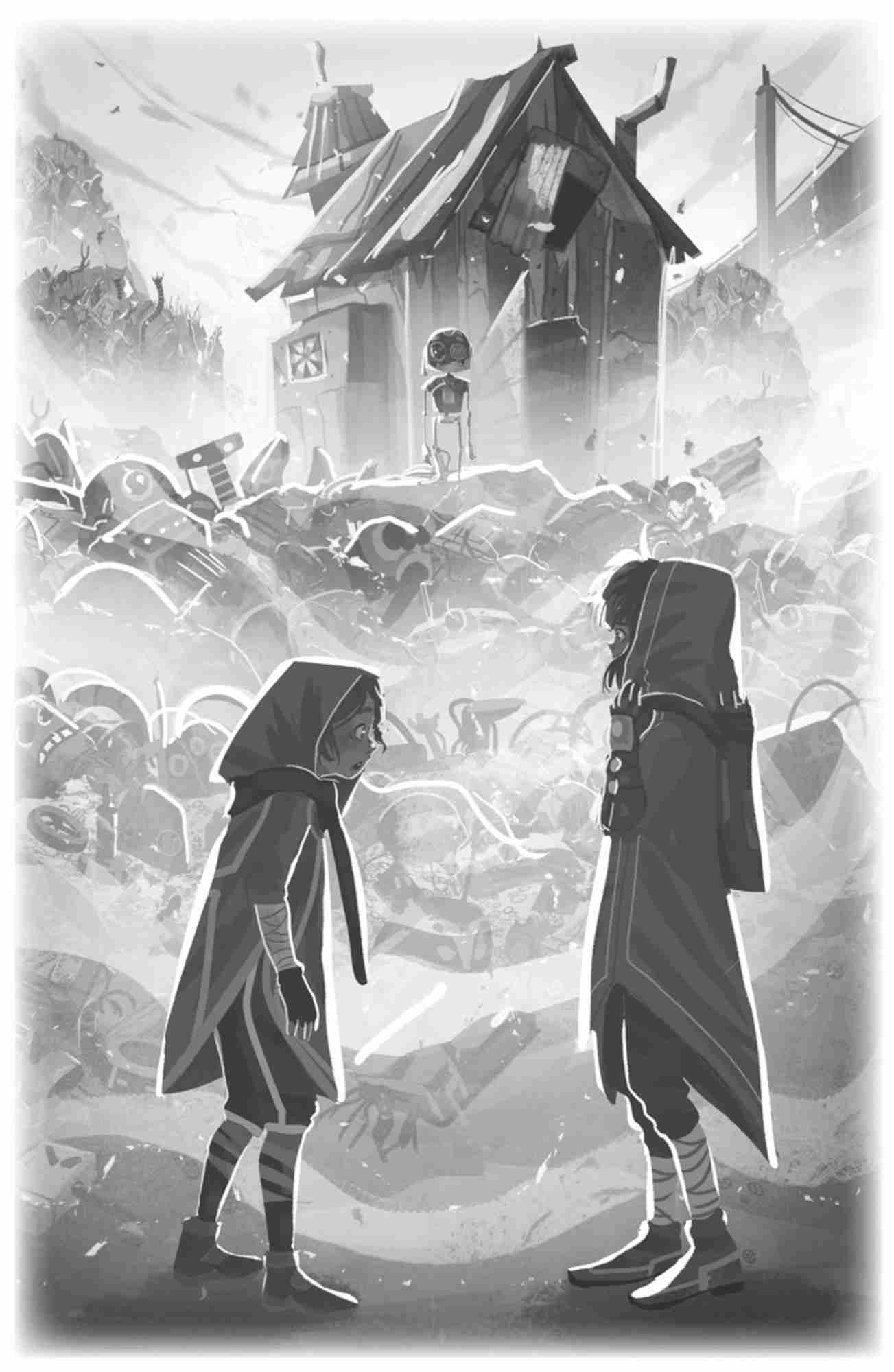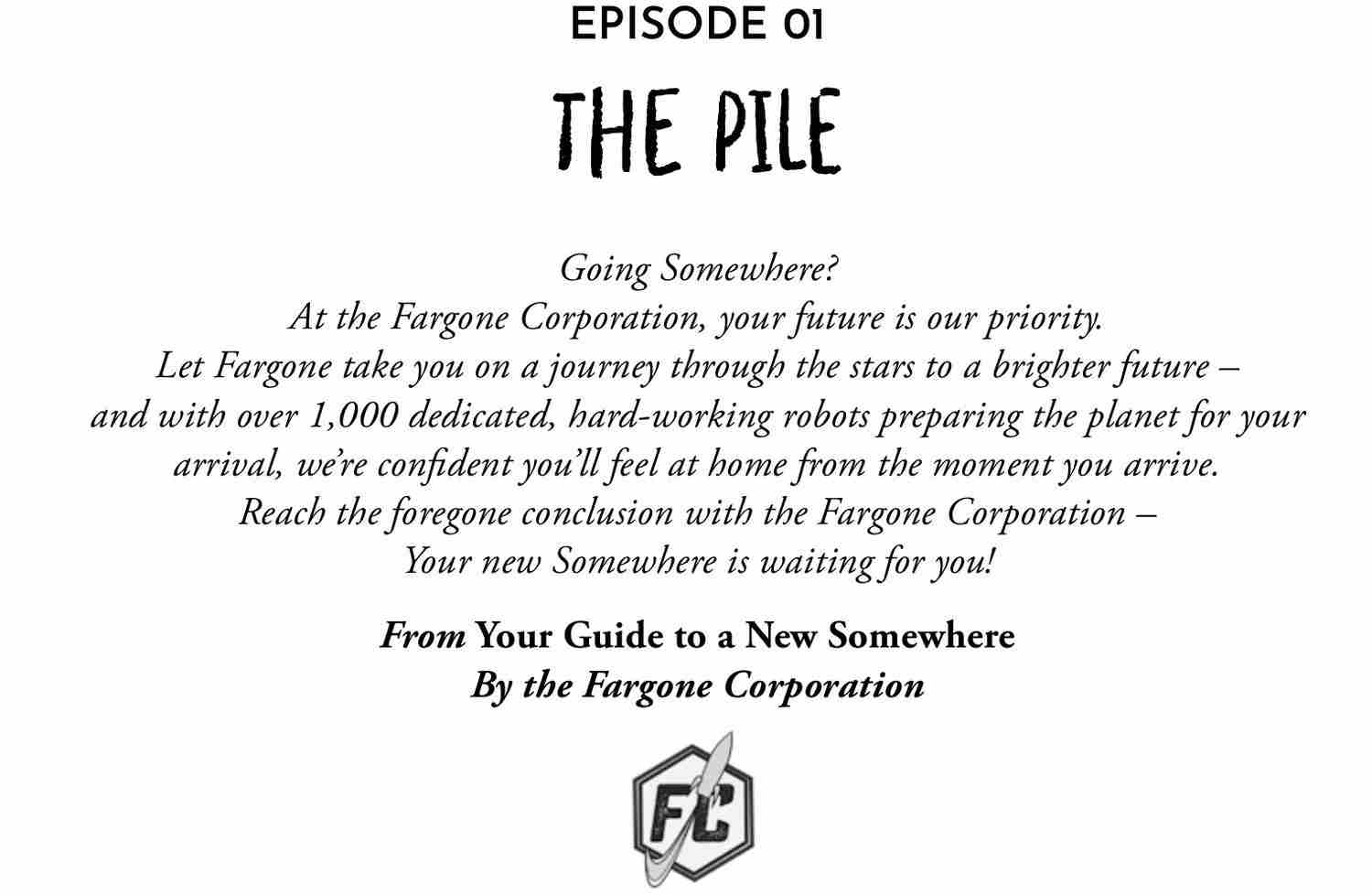On the Pile, the one and a half suns could never set soon enough.
Every day was the same. The robot woke with the dawn upon his small patch of junk. Among the small mountains of debris before him he saw ruined robot parts – limbs … heads … torsos … even whole bodies … decimated robot cases. These cases piled up in their hundreds, their chest cavities open and empty, motionless and inert without their life-giving cores.
The robot watched the Pile’s other residents – junk cases – rusting robots on their last metal legs, trying to make the best of a miserable existence. He watched them build crude houses out of cast-offs, and call them homes.
But the robot did nothing.
He just sat there and waited for his core to run out of charge.
It never did.
Even though he saw countless junk cases grind to a halt, he did not lose an ounce of power. Not a single ounce. For the robot’s core had been built to last, like a battery that never ran out … a heart that never stopped beating. He was never going to fade away, as he had hoped.
So he watched the suns set again.
And again, and again.
On the eve of his tenth year on the Pile, the robot woke up with the dawn and stared out as normal. Makeshift shacks now dotted the landscape. The robot had watched dozens of junk cases build humble homes and humbler lives, before unceremoniously running out of charge. The robot looked back at his empty patch and realized something had changed. He realized he was tired of waiting to fade away.
He didn’t want just to be there.
He wanted to belong there.
It took the robot a full month to build his house, a ramshackle cabin made from leftover parts even the junk cases didn’t want. But as he chiselled the word WELCOME on to a sheet of battered tin and laid it outside his front door, he realized that he had made himself a home.
A week later, as he furnished his home with the final piece of improvised furniture, he realized he had given himself a small sense of belonging.
And a week after that, as he tended the flower bed in his tiny front garden, the robot realized that for the first time since he had arrived on the Pile, he had not thought about humans. It seemed he had finally found a way to leave the past behind.
For that he was eternally grateful.
“It’s him,” said a voice. The robot dropped his trowel and spun round. Silhouetted in the glare of one and a half setting suns stood two figures. They were no more than a metre away – one slightly taller than he was, the other a little shorter. Their bodies were covered by thick, pocket-ridden ponchos. Hoods pulled over their heads cast dark shadows over their faces. One had a large satchel strung across their chest. A small power battery poked out of the top.

Junk cases, thought the robot.
“This is -zk- my patch,” he said, gesturing back at his house. “Get lost.”
“It’s not him,” said tall.
“Is too,” short replied.
“Can’t be.”
“Can too.”
“But look at him.”
“Exactly, we finded him.”
“Found.”
The short one turned back to the robot. “You are him, aren’t you?”
“Who are -zk- you?” the robot stuttered. Short lowered her hood.
The tall one shouted, “Wait!” but the robot had already seen her face. He stumbled backwards, suddenly weak at the knees, and fell, rump first, into his flower bed. He stared up in horror, hardly able to believe his eyes.
Human.
A human child.
Which was impossible.
Because there were no humans on Somewhere 513.
Tall lowered her hood then too.
Another human.
“How…?” he gasped. “What -zk- who are—”
“I’m Gnat and that’s Paige,” interrupted short. “Gnat”. Brownish skin. Reddish hair. 5.7 years old. Grubby. Missing central incisor. 60% water. “We came to find you,” Gnat continued. She prodded at the gap in her teeth. “We had a little moon-buggy but we crashed it on the first day and my tooth fell out but it was loose anyway and we walked the rest of the way on our feet and now is now, and we’ve find – founded you.”
“I’m telling you, this isn’t him,” said tall. “Paige”. Much the same as short, but older. 10.3? No, 10.4. Less grubby, no less scruffy. Strangely familiar. 100% impossible. She pulled her poncho off her arm and inspected a metallic armguard fixed to her left wrist. “Tracer must’ve conked out,” she added with a tut.
The robot shook with disbelief. He had hoped never to see another human face again … hoped never to be reminded of the life he had lost – of the robot he once was.
Yet here were two of them, watching him expectantly.
“You -zk- can’t be…” the robot whispered, staring up at them. The light from his left eye flickered slightly and he wondered if faulty wiring could be causing him to hallucinate. “No -zk- way,” he added. “You can’t be real.”
“Can too,” replied Gnat, her gap-toothed smile wide and delighted. “Paige, tell him we’re real.”
“Let’s go,” said Paige, peering at the robot. “It can’t be him.”
“Him who?” asked the robot.
“It’s so him,” insisted Gnat with a gleeful grin.
“But look at him,” said Paige. “He’s junk.”
“Hey!” snapped the robot. “That’s -zk- our word. You don’t get to say that word.”
“No offence,” said Paige with a shake of her head. “But also, seriously, look at you.”
The robot looked down at his hands. They were spindly and dull and creaked with rust. He ran his fingers across his simple approximation of a face, little more than a pair of eyes and a small, hinged mouth, and then regarded his body, a battered, grey cylinder covered in rust, dings and dents. His legs didn’t seem to belong to his body, nor to each other. His right was yellowish, with two pistons and a wide, flat foot, while the left was spindly and dull and had no foot at all, ending in a simple metal rod. There was no doubt he was the most downgraded robot on the Pile. Even among the junk cases, he was an unimposing sight.
“I know what I look like,” he huffed.
“Don’t listen to her – I think you look nifty. You’re all bits and pieces,” said Gnat. She nodded to herself and added, “I’m going to call you ‘Scrap’.”
“No, you’re not,” insisted the robot. With a tinny whirr, he managed to get to his feet, tottering unsteadily like a newborn calf.
“What’s it like being a robot, actually?” asked Gnat, peering at him. “Do you get hot and cold ’cause I’m always hot, and does your brain think one thing or one million things because I think one thing or two things but that is it and I’d definitely like to be an actual robot. I’d be like you –” she leaned in and added, as if to remind the robot what she had done for him – “but not called Scrap ’cause that’s your name.”
“That is not my -zk- name,” insisted the robot.
“So what is your name?” asked Paige bluntly.
The robot paused. He hadn’t spoken his name in ten years. Indeed, he had vowed never again to speak it aloud.
“Doesn’t matter what my name is,” the robot grunted, jabbing his rusty chest with a rustier finger. “You can’t just go around namin’ folk.”
“Why not?” asked Gnat.
“’Cause you can’t.”
“Why not?”
“Because you can’t!” Scrap snapped. “Names are -zk- important.”
“Sorry,” said Gnat. Then she turned to Paige and added in a loud whisper, “I bet he’s called Scrap.”
The robot let out a grunt and looked around.
“Might as -zk- well be…” he sighed, unaware that, from that moment, he would forever be known as Scrap. “Just a good-for-nothin’ junk case…”
“Junk case?” Paige repeated.
“This body – if I was any more downgraded, I’d be nothin’ but rust and dust,” the robot replied. “There’s nothin’ on the Pile that’s in a worst state than me. Trust me, I’m not the ’bot you’re looking— Wait, who are you? You’re… Humans are outlawed on Somewhere 513. What are you gubs even doin’ here?”
“Founding you,” replied Gnat. “We need your help.”
“Me? Why?”
“Why do you think?” said Gnat as if the answer was obvious. “You’re King of the Robots.”
